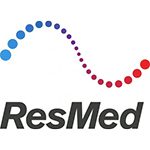 ResMed (NYSE:RMD) CEO Mick Farrell sees light on the horizon for the medical device firm.
ResMed (NYSE:RMD) CEO Mick Farrell sees light on the horizon for the medical device firm.
Farrell spoke to MassDevice at AdvaMed’s annual meeting last week in Minneapolis about the company’s acquisitions and the challenges and triumphs ResMed has faced.
ResMed has made 3 major acquisitions over the past year, picking up portable oxygen therapy developer Inova Therapeutics, Chinese sleep disorder device developer Curative Medical and cloud-based healthcare software developer and service provider Brightree. And although Farrell did not reject the idea of future acquisitions, he said the company is prioritizing finding some return from its previous buys.
“Our primary goal is to show a really strong return from them, and they’re in 3 different areas. One of them was a double-down on China, where we now have a product that’s designed in China, made in China and sold for Chinese hospitals. In fact, Chinese hospitals can only buy domestic-made product. It was an investment in a segment that we really had never delved into before, and it took us from #2 to #1 market share in the Chinese market,” Farrell said. “What’s next is to make sure we get lots of return from our investments in China, our investments in POC and our investments in software as a service and really linking that to our whole healthcare phonetics digital health connected game play.”
Farrell said he sees the company growing outside of just M&A, saying that ResMed has “changed the basis of competition in our industry.”
“About 2.5 years ago, we put a cellular communication chip inside every sleep apnea device that we sell globally. We’re first in the industry to do it. They’re 100% cloud connected to the sleep apnea devices. We’ve most recently added communications capability to our ventilators. So, our life-support ventilator now has cloud-base connectivity. That’s just 6 months ago,” Farrell said. “So, over the last 2 years we’ve changed from a company that was making medical devices that were smaller, quieter, and more comfortable, to now … change the basis of competition from smaller, quieter and more comfortable to smaller, quieter, more comfortable and more connected.”
Despite returns from the acquisitions on the horizon, the company’s 1st quarter earnings missed expectations. ResMed reported profits of $76.1 million, or 54¢ per share, on sales of $465.5 million for the 3 months ended Sept. 30. That amounts to a 8.2% bottom-line slide despite sales growth of 13.1% compared with the same period last year.
After adjusting to exclude 1-time items, earnings per share were at 62¢, a 2¢ off of analysts’ consensus expectation on Wall Street. Revenues also fell short of the consensus forecast for $518.6 million.
Shares fell approximately 3% Oct. 25, closing at $60.55 with trading volume at 4 million, significantly higher than its daily average.
As for what’s on the horizon for ResMed, Farrell seemed particularly enthusiastic, saying the company is looking to branch out into other disease states, and taking on its biggest competitors: Lack of education and low adherence.
“One of our biggest challenges is 40 to 60 million Americans have sleep apnea and 6 million diagnose their own therapy. So, somewhere around 85…80, 85, 90% of the suffocation patients, tens of millions are out there,” Farrell said. “We’ve changed adherence rates from historic norms of 50 or 60% up to 80%, even in some studies north of that. So, that 20% improvement in adherence is huge. It keeps patients out of hospital, it reduces the cost to the health care system, most importantly, it improves the quality of life for the patients.”
ResMed has partnered with Nintendo and Apple to create health care and quality-of-life improving products, Farrell added, as well as inking other partnerships as the company looks to branch into sleep wellness products and treating chronic obstructive pulmonary disease.
“The next horizon is chronic obstructive pulmonary disease. Two hundred million patients worldwide, we treat them with non-invasive ventilation, life support ventilation, portable oxygen concentrators … its a huge opportunity of which we are just starting to penetrate globally,” Farrell said.

